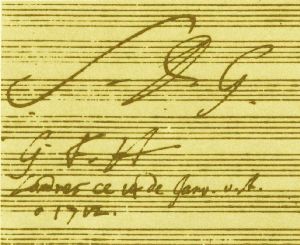“The aim and final end of all music should be none else other than the glory of God and the refreshment of the soul.” – J.S. Bach
 Public Domain, https://commons.wikimedia.org
Public Domain, https://commons.wikimedia.org
Many individuals over the years have asked me who my favorite composer is and I have always answered them I really do not have one – I have many! However, one composer stands out as a mentor for myself as well as most serious church musicians – a composer who millions of people know and is arguably the most famous and gifted of all composers past and present in the entire western world. Since the year of his death in 1750, Johann Sebastian Bach’s music lifts the heart and energizes the soul.
However, many do not know that behind the facade of this brilliant composer was a theologian whose heart was after God, only God! In fact, Bach believed that music was a “refreshment of spirit.” He studied the Bible rigorously. At the age of 48, Bach acquired Luther’s three-volume translation of the Bible. He underlined passages, inserted missing words, and made notes in the margin. He was also known as “the Fifth Evangelist” who had an extraordinary influence leading countless lives to Christ.
One Bible passage that received Bach’s special attention was 1 Chronicles 25, the chapter that describes how King David appointed 288 musicians to serve at the tabernacle. Bach wrote in the margin: “Note well: this chapter is the true foundation of all God-pleasing church music”. Bach was right. David’s example shows that music is at the very heart of worship that pleases God. It is right and good to employ skilled musicians to lead the worship of God. The function of a church musician is to proclaim the Word of God.
Few musicians have ever understood this more completely than Johann Sebastian Bach, who dedicated his life to music in the service of Christ. This is our approach to music at Pinnacle. Like the sermon, our worship music aims to proclaim the Word of God. Scripture instructs us to “Let the word of Christ richly dwell in us as we teach and admonish one another with psalms and hymns and spiritual songs.” The reason worship music has this teaching function in the church is because what we sing is the Word of God.
Bach was an extraordinary gifted musician. But his basic commitment is something that every Christian can emulate. It is well known that Bach often signed his compositions with the letters “s.D.g”: soli Deo Gloria, or “glory to God alone.” The glory of God is the chief end of music because it is the chief end of man. Whatever we do, we should do it as well as we possibly can, so as to glorify God.










